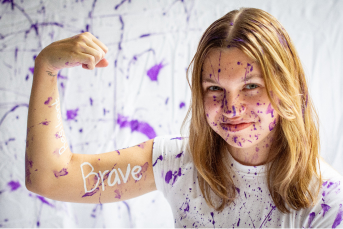
Have you ever tried to write about how your epileptic seizures feel? You wouldn’t be the first. Many famous writers with epilepsy have tried to put the feeling of auras and seizures into words.
French novelist Flaubert said he experienced: “a whirlpool of ideas and images in my poor brain, during which it seemed that my consciousness … sank like a vessel in a storm”. English poet Alfred Lord Tennyson described the feeling as: “the weirdest of the weirdest, utterly beyond words”. And Russian author Fyodor Dostoevsky, who had a rare form of ‘pleasurable’ seizures told a friend he felt: “a happiness unthinkable in the normal state and unimaginable for anyone who hasn’t experienced it”.
Throughout history, writers have tried to express what epilepsy feels like – and to describe it in their work. The following famous writers with epilepsy are just some of the best-known authors believed to have had the condition.
5 important writers with epilepsy
Our modern understanding of epilepsy and how to diagnose it has improved significantly in recent decades. Many scholars believe the following writers had the condition, but we can’t always be certain that epilepsy was the cause of their seizures.
Fyodor Dostoevsky, 1821 – 1881
Widely regarded as one of the best novelists of all time, Fyodor Dostoevsky’s work explored themes of human psychology, philosophy and religion. The Russian’s best-known work is Crime and Punishment, a story of a student who murders his landlady.
Dostoevsky often wrote about his experience of epilepsy and realistically portrayed some of his characters having auras and seizures too.
Edgar Allen Poe, 1809 – 1849
One of the most important figures in American literature, Edgar Allen Poe is best known for his short stories and poetry. The writer, from Boston, is regarded as the inventor of the detective fiction genre and one of the first science fiction authors too.
Poe often described experiences of unconsciousness and confusion which some people believe could be put down to undiagnosed complex partial seizures. This kind of seizure was poorly understood at the time so some people thought Poe’s unusual behavior was related to an alcohol problem, when he may actually have been experiencing confusion or postictal disturbance caused by seizures.
Gustave Flaubert, 1821 – 1880
Flaubert was a hugely influential French novelist who was known for his dedication to realistic writing – he hated using clichés or vague language. Flaubert’s best-known novel is Madame Bovary, the story of a woman desperate to escape the boredom of rural life.
Flaubert had his first seizure at the age of 22 and they appear to have started happening in his sleep. He would feel auras before his seizures, and they were more frequent at different times in his life.
Agatha Christie, 1890 – 1976
The best-selling fiction writer of all time, English novelist Agatha Christie is known around the world for her detective stories and characters like Hercule Poirot and Miss Marple. Her novels and short stories have reportedly sold over 2 billion copies worldwide – only Shakespeare plays and The Bible have sold more.
Christie suffered from the brain illness dementia in later life and experienced symptoms of epilepsy such as seizures too.
Truman Capote, 1924 – 1984
The author of Breakfast at Tiffany’s and In Cold Blood, American writer Truman Capote is considered one of the best authors of the 20th century. Born in New Orleans, his books won critical acclaim and many were turned into hit movies.
Capote suffered ill-health in later life, partly due to alcohol and drug abuse – and he took epilepsy medicine to control his seizures.
Many writers with epilepsy have written about their condition – and it has even played an important part in their stories. Whether you are the next Dostoevsky or not, many people find that writing about their health is a helpful way of coping. Is it something you have tried?
*Photo by Richard Clyborne of Music Strive

















